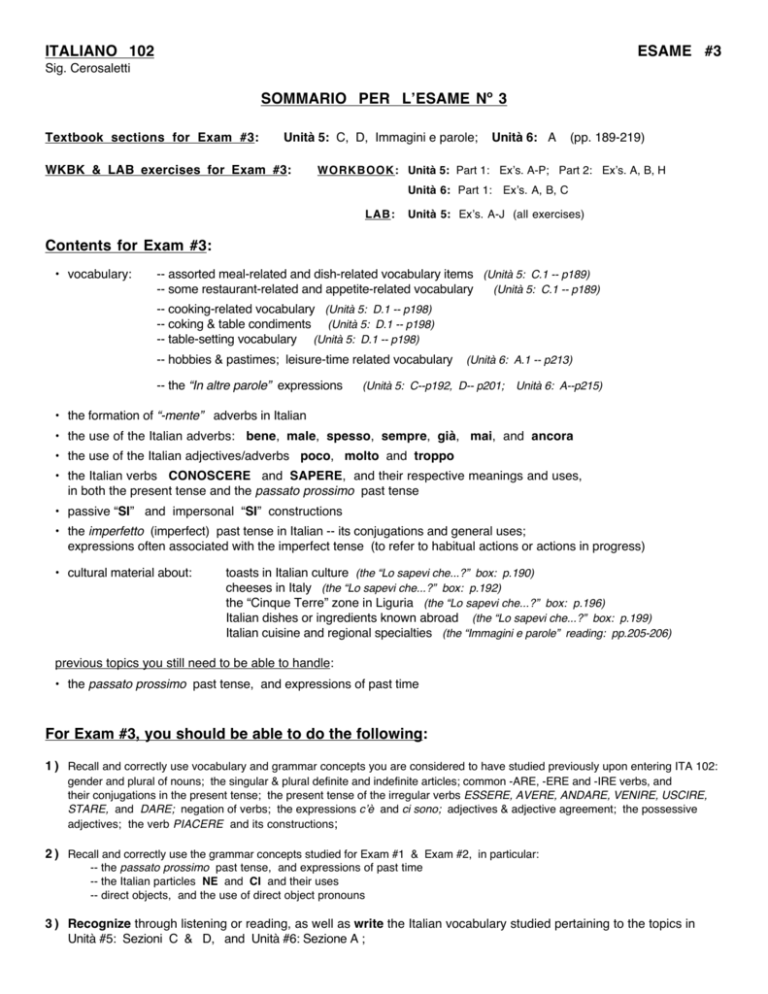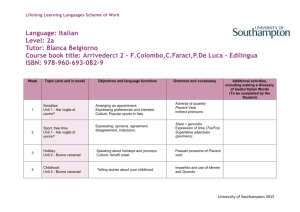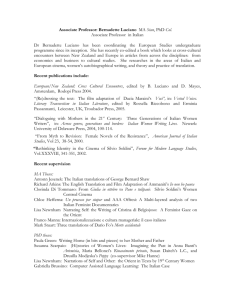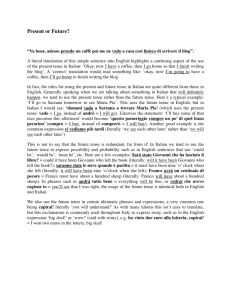ITALIANO 102 ESAME #3 SOMMARIO PER L'ESAME Nº 3 Contents
advertisement

ITALIANO 102 ESAME #3 Sig. Cerosaletti SOMMARIO PER L’ESAME Nº 3 Textbook sections for Exam #3: Unità 5: C, D, Immagini e parole; WKBK & LAB exercises for Exam #3: Unità 6: A (pp. 189-219) WORKBOOK: Unità 5: Part 1: Ex’s. A-P; Part 2: Ex’s. A, B, H Unità 6: Part 1: Ex’s. A, B, C LAB: Unità 5: Ex’s. A-J (all exercises) Contents for Exam #3: • vocabulary: -- assorted meal-related and dish-related vocabulary items (Unità 5: C.1 -- p189) -- some restaurant-related and appetite-related vocabulary (Unità 5: C.1 -- p189) -- cooking-related vocabulary (Unità 5: D.1 -- p198) -- coking & table condiments (Unità 5: D.1 -- p198) -- table-setting vocabulary (Unità 5: D.1 -- p198) -- hobbies & pastimes; leisure-time related vocabulary -- the “In altre parole” expressions (Unità 6: A.1 -- p213) (Unità 5: C--p192, D-- p201; Unità 6: A--p215) • the formation of “-mente” adverbs in Italian • the use of the Italian adverbs: bene, male, spesso, sempre, già, mai, and ancora • the use of the Italian adjectives/adverbs poco, molto and troppo • the Italian verbs CONOSCERE and SAPERE, and their respective meanings and uses, in both the present tense and the passato prossimo past tense • passive “SI” and impersonal “SI” constructions • the imperfetto (imperfect) past tense in Italian -- its conjugations and general uses; expressions often associated with the imperfect tense (to refer to habitual actions or actions in progress) • cultural material about: toasts in Italian culture (the “Lo sapevi che...?” box: p.190) cheeses in Italy (the “Lo sapevi che...?” box: p.192) the “Cinque Terre” zone in Liguria (the “Lo sapevi che...?” box: p.196) Italian dishes or ingredients known abroad (the “Lo sapevi che...?” box: p.199) Italian cuisine and regional specialties (the “Immagini e parole” reading: pp.205-206) previous topics you still need to be able to handle: • the passato prossimo past tense, and expressions of past time For Exam #3, you should be able to do the following: 1 ) Recall and correctly use vocabulary and grammar concepts you are considered to have studied previously upon entering ITA 102: gender and plural of nouns; the singular & plural definite and indefinite articles; common -ARE, -ERE and -IRE verbs, and their conjugations in the present tense; the present tense of the irregular verbs ESSERE, AVERE, ANDARE, VENIRE, USCIRE, STARE, and DARE; negation of verbs; the expressions c’è and ci sono; adjectives & adjective agreement; the possessive adjectives; the verb PIACERE and its constructions; 2 ) Recall and correctly use the grammar concepts studied for Exam #1 & Exam #2, in particular: -- the passato prossimo past tense, and expressions of past time -- the Italian particles NE and CI and their uses -- direct objects, and the use of direct object pronouns 3 ) Recognize through listening or reading, as well as write the Italian vocabulary studied pertaining to the topics in Unità #5: Sezioni C & D, and Unità #6: Sezione A ; pagina 2 4 ) Recognize through listening or reading, as well as write the Italian expressions studied from the In altre parole green boxes in Unità #5: Sezioni C & D, and Unità #6: Sezione A ; 5 ) Recall, recognize, and correctly use the following common adverbs, to tell how and action is or was done: bene (well), male (poorly), spesso (often), sempre (always), già (already), mai (ever/never), and ancora (still, yet) ALSO: Create “-mente” adverbs from adjectives, and use them correctly; 6 ) Correctly use the adjectives/adverbs poco, molto and troppo --- to tell that there is little, a lot, or too much of something, or that there are few, many, or too many of something -- to indicate the degree to which something is a certain way: not very, very, or too (difficult, large, spicy, etc.) -- to indicate that someone does something seldom, a lot, or too much 7 ) correctly conjugate the verbs CONOSCERE and SAPERE in the present tense, and know when to use each: -- to indicate that one is acquainted with someone, or familiar with a place or thing; OR -- to indicate that one knows a body of knowledge (like a language), pieces of information, facts, or how to do something ALSO: correctly conjugate these verbs in the passato prossimo past tense, to indicate that one met someone or became acquainted with a place or thing, OR found out something (some information) 8 ) Use the pronoun SI to create impersonal-subject sentences like, “People eat well here”/”One eats well here”, and passive sentences like, “Italian is spoken here” -- in either the present tense or passato prossimo past tense; 9 ) Recognize and recall common, high-frequency verbs in Italian, and conjugate them in the IMPERFECT past tense, to create sentences as well as construct questions, to present descriptions in the past, present habitual activities at some time in the past, or to present actions in progress in the past; ALSO: recall and write expressions in Italian that often accompany the presentation of habitual actions or actions in progress 1 0 ) CULTURE: -- identify and use Italian expressions for wishing someone a nice meal, toasting, or praising the cook; -- identify the type of Italian pasta sauce based on a description of its ingredients -- identify salient facts about Italian cheeses, and the best-known Italian cheeses; -- identify commonly-known Italian dishes and regional specialties; -- identify general facts about and common ingredients in Italian cuisine; -- identify the region ofLiguria on a map of Italy; -- identify salient facts about the “Cinque Terre” zone in Liguria ****************************************************************************************** EXAM #3: TYPES OF TEST ITEMS: NOTE: Practice exercises for exams do NOT include practice for vocabulary labelling or matching sections, nor practice with oral questions, vocabulary listening comprehension, or cultural material. (an answer key for all practice items follows at the end of the exercises, on page 4) • a listening comprehension section based on an audio clip: --answer questions (either in English, or multiple choice in English) about the content of a radio cooking show • oral questions: write a complete sentence in Italian for each oral question the instructor asks • vocabulary writing: • vocabulary matching: based on a drawing: write the Italian for specified vocabulary items (e.g.: table setting, pastimes) choose the correct vocabulary word from a list, based on a definition or an incomplete sentence in Italian • culture: short answer, matching and/or multiple choice questions about the culture topics from the corresponding “Lo sapevi che...?” culture sections in the text, as well as the Unit 5 reading • culture & vocabulary: identify the kind of pasta sauce based on a description in English ITALIANO 102 OVERVIEW & EXERCISES: EXAM #3 pagina 3 • GLI AVVERBI: For each item, complete the sentence in Italian, telling how the subject does the action in question. For your sentences, create adverbs from the following adjectives, choosing based on the context in each item. gentile (kind, courteous) 1) 2) 3) 4) lento preciso prudente Mario prende molto tempo per dare un esame! Lavora _____________________. Valeria è molto meticolosa, e sempre fa le cose in modo molto esatto. Fa il suo lavoro ___________________. Giorgio è molto cortese quando conversa! Con gli adulti parla molto _____________________. Sandro guida la macchina troppo veloce! Non guida ____________________. • DIRECTED SENTENCES: 1) 2) 3) 4) 5) 6) 7) 8) 9) For each item, write a complete sentence in Italian, as directed in English. Indicate someone you know who works too much . Indicate whether you think Americans eat too much fat (grassa) or not . Indicate someone you know who goes to parties a lot . Indicate someone you know who has many CD’s . Indicate someone you know who has little free time . Indicate someone who sings well . Indicate someone you know who never ate (has eaten) calamari . Indicate someone you know who has already finished their laurea (college degree) . Indicate someone you know who has not yet finished their laurea . • THE VERBS FOR “TO KNOW” IN ITALIAN Complete each sentence with the correct conjugation of the appropriate Italian verb for “TO KNOW” , in either the present tense or the passato prossimo past tense, as required by the time frame of the sentence. 1) 2) 3) 4) 5) 6) 7) Parli di Pippo? Sì, io lo ________________________________. È un ragazzo molto bravo. Paola ed io ________________________________ il Ristorante Bella Sera, y ci piace moltissimo. I miei compagni d’appartamento ________________________________ cucinare bene. Mio padre ________________________________ mia madre nel 1970. Luigi, _______________________________ il numero di telefono di Cecilia? Io non l’ho. Io non ________________________________ dove vive Carolina. Ieri sera noi ________________________________ che è morto il nonno di Riccardo. • “SI” CONSTRUCTIONS IN ITALIAN Re-phrase the underlined part of the following sentences, using a “SI” construction instead. 1) 2) 3) 4) Non possiamo fumare nei ristorante nello Stato di New York. In Italia non bevono mai il cappuccino dopo un pasto. Puoi comprare buona frutta a Tops. Potete trovare i compact disc a un buon prezzo a Best Buy. • DIRECTED SENTENCES: “SI” CONSTRUCTIONS IN ITALIAN For each item, write a complete sentence in Italian, as directed in English. Use a “SI” construction in your sentence. 1 ) Tell something that people do in the summer in New York State. 2 ) Tell where one studies well on campus. 3 ) Tell in what circumstances is one (are people) happy. (for example: “When one is one vacation, one is happy.”) • IMPERFECT PAST TENSE: incomplete sentences Teresa is remembering her childhood. For each sentence, choose the verb from the list below that BEST completes the sentence, and conjugate it in the imperfect past tense to tell that the given subject did the action routinely or habitually when she was a kid. NOTE: There are more verbs than will be needed. No verb may be used more than once. ANDARE COMPRARE 1) 2) 3) 4) 5) DIRE ESSERE FARE GIOCARE SAPERE VEDERE I miei genitori _________________________________________ giovani. Mia madre _________________________________________ la spesa per la famiglia. Io _________________________________________ a scuola ogni giorno. I miei amici _________________________________________ al calcio dopo la scuola. I miei fratelli ed io delle volte non _________________________________________ la verità (truth) ai genitori. pagina 4 • IMPERFECT PAST TENSE: more incomplete sentences For each verb infinitive and specified subject, choose an appropriate completion that makes sense from the list below, and conplete the sentence, to tell what the person(s) used to do as a child. (There are more completions than will be needed.) • buono • i compiti 1) 2) 3) 4) 5) • il latte • le verdure • tardi • vicino FINIRE: Io_________________________________________________________ prima di guardare la TV. BERE: E tu? ______________________________________________________ di ragazzino. VIVERE: E voi? ______________________________________________________ ai nonni? MANGIARE: Mio fratello non____________________________________________________________. ESSERE: E tu? ___________________________________________________________________ di ragazzino? ANSWER KEY FOR PRACTICE ITEMS • GLI AVVERBI: 1) lentamente (He takes a lot of time to take an exam... he works slowly ) 2) precisamente (she does things in a very exact way... she does her work precisely ) 3) gentilmente (He is very courteous... with adults he speaks kindly/courteously ) 4) prudentemente (Sandro drives the car too fast... he doesn’t drive prudently ) • DIRECTED SENTENCES: 1) 2) 3) 4) 5) Mio padre lavora troppo. Gli americani mangiano troppa grassa. Il mio amico Jeff va a feste molto. Mio fratello ha molti CD. La mia amica Sue ha poco tempo libero. 6) 7) 8) 9) Andrea Bocelli canta bene. Mia sorellla non ha mai* mangiato i calamari. Mio cugino Ben ha già* finito la laurea. Io non ho ancora* finito la laurea. *Note the placement between the helping verb and past participle. • THE VERBS FOR “TO KNOW” 1) 2) 3) 4) 5) 6) 7) conosco (Are you talking about Pippo? Yes, I know (am acquainted with) him. He is a good guy.) conosciamo (Paola and I know (are familiar with) the Bella Sera Restaurant, and we really like it.) sanno (My apartment mates know how to cook well.) ha conosciuto (My father met (made the acquaintance of) my mother in 1970.) sai (Luigi, do you know Cecilia’s phone humber? I don’t have it.) so (I don’t know where Carolina lives.) abbiamo saputo (Last night we found out (learned) that Riccardo’s grandfather died.) • “SI” CONSTRUCTIONS - Part 1 1) 2) 3) 4) Non si può fumare... / Non si permette fumare... Non si beve mai il cappuccino... Si può comprare buona frutta... Si possono comprare i compact disc... • “SI” CONSTRUCTIONS - Part 2 [answers will vary] 1) Si va in vacanza. / Si prende il sole. / ... 2) Si studia bene in biblioteca. 3) Quando si è in vacanza, si è contenti (felici) . • IMPERFECT PAST TENSE -- Part 1 1 ) I miei genitori erano giovani. (My parents were young.) 2 ) Mia madre faceva la spesa per la famiglia. (My mogther did (would do, used to do) the grocery shopping for the family.) 3 ) Io andavo a scuola ogni giorno. (I would go to school every day.) 4 ) I miei amici giocavano al calcio dopo la scuola. (My friends would play soccer after school.) 5 ) I miei fratelli ed io delle volte non dicevamo la verità ai genitori. (My siblings and I sometimes would not tell our parents thr truth.) • IMPERFECT PAST TENSE -- Part 2 1 ) Io finivo i compiti prima di guardare la TV. (I would finish my homework before watching TV.) 2 ) E tu? bevevi il latte di ragazzino. (And you? Would you drink (Did you used to drink) milk as a kid?) 3 ) E voi? Vivevate vicino ai nonni? (And you guys? Did you all live near your grandparents?) 4 ) Mio fratello non mangiava le verdure. (My brother would not eat vegetables.) 5 ) E tu? Eri buono di ragazzino? (And you? Were you good as a kid?)




